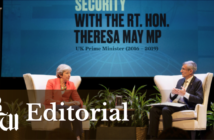It soars above the heads of Lehigh students and Bethlehem residents alike. Gliding through the air, it observes all that is happening below on the side the mountain.
This eye in the sky is not one of the two hawks named Engi and Neer that have made their home on the side of the STEPS building.
No, it is instead the Lehigh University Police Department’s new drone.
LUPD chief Edward Shupp said the department purchased the drone, which is an unmanned aircraft, 15 months ago. It is managed by officer Drew Devery, who is a member of the crime prevention unit. Shupp said in a previous interview with The Brown and White that the drone is used to monitor both on- and off-campus areas to ensure the safety of the children in the area.
Because drones are a relatively new technology, there are few regulations for the operation of the devices. The Federal Aviation Administration requires training for individuals operating the drone, and the device cannot be flown more than 400 feet in the air. Other than that, there are few laws pertaining to the use of the drone and its aerial-surveillance abilities.
The lack of restrictions coupled with the lack of transparency about LUPD’s use of the drone should be cause for concern from both Lehigh students and South Bethlehem residents.
LUPD already has a state-of-the-art surveillance system that is used to monitor almost all nooks and crannies on Lehigh’s campus, so the drone seems like an unnecessary purchase if its goal is to monitor happenings on and around campus. They also patrol off-campus streets frequently as is evident by the white Dodge Chargers that drive back and forth on a seemingly routine route. If the goal is safety through constant surveillance, LUPD can already accomplish that with the systems they have in place.
The Department of Homeland Security launched an initiative in 2012 to work with police departments across the country to use drones in their policing. While this initiative exists, it doesn’t seem like the entity that works to combat terrorism in the United States was hoping LUPD would be one of the police departments to own a drone to combat terrorism on and around campus.
The use of the drone must be questioned, especially because this is a device that can now provide unprecedented access to monitor activities both on and off campus.
It is one thing if LUPD arrives at an off-campus house after a noise complaint is filed. It is another situation entirely if a drone is used to survey an off-campus area, and then LUPD officers act on the information acquired from the drone. This is akin to an officer walking onto a property without a legal reason, that officer then finding a reason to be on the scene and retroactively using that reason to justify his or her presence there.
In the latter situation, it is almost as if the drone was used to find a reason to enter the property because officers would not have a legal right to enter the property without causation. The new drone now provides LUPD with the opportunity to give officers information they would not have a legal right to obtain otherwise. The overhead camera with the bird’s eye view gives them access that they would not have under normal measures.
Now say someone is performing an innocuous task in a backyard off campus. Even if this act cannot be seen from the street, should the individual now expect to be watched via drone in the name of safety?
Mass surveillance has become more commonplace than ever in the midst of fear of terror attacks from both foreign and domestic entities. With the development of technology that can be used for mass surveillance, the fourth amendment is as important as ever.
The amendment protects individuals from searches without warrants as well as unlawful intrusion in private spaces where there is a legitimate expectation of privacy, according to the Legal Information Institute.
This reasonable expectation of privacy means that those in off-campus houses closest to campus, whether South Bethlehem residents or students, should expect privacy inside and directly around their homes as long as they are not causing a disturbance. A reasonable expectation of privacy means you are afforded privacy in areas that would be considered private by most members of society.
The drone seems to directly violate this expectation of privacy if it is being flown over areas such as backyards that are not visible from the street by an officer on foot. The drone can be used to take the place of an officer on foot on a sidewalk or some other public space, but it should not be used to gain a view of a place that an officer on foot or in a car could not access.
If the drone is really being used only to fight crime and protect the children, it has no business flying over off-campus houses without a reason to be there.
Even if the legal use of the drone is not in question, the ethical use of the drone should be taken into consideration. Lehigh University should not support a police department that leads students to have no expectation of privacy, even off campus.
It is also the responsibility of LUPD to be transparent about the use of the drone. We as a campus community were largely unaware that LUPD purchased a drone so long ago. It is time for LUPD to address the ethical repercussions of mass surveillance and provide the community with specific reasoning for the purchase and use of the drone.
The hawks may be watching harmlessly from above, but big brother is also watching in the form of the LUPD drone.





Comment policy
Comments posted to The Brown and White website are reviewed by a moderator before being approved. Incendiary speech or harassing language, including comments targeted at individuals, may be deemed unacceptable and not published. Spam and other soliciting will also be declined.
The Brown and White also reserves the right to not publish entirely anonymous comments.
1 Comment
Very responsible of the Brown&White to criticize and open dialogue into this big issue; hope the B&W follows up with investigative reporting on this issue and hopefully affects some change.